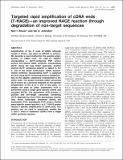Files in this item
Targeted rapid amplification of cDNA ends (T-RACE)-an improved RACE reaction through degradation of non-target sequences
Item metadata
| dc.contributor.author | Bower, Neil I. | |
| dc.contributor.author | Johnston, Ian A. | |
| dc.date.accessioned | 2011-12-05T16:33:59Z | |
| dc.date.available | 2011-12-05T16:33:59Z | |
| dc.date.issued | 2010-11 | |
| dc.identifier | 8682252 | |
| dc.identifier | 2cdab890-5c49-4ec5-8f38-d65a65c66a92 | |
| dc.identifier | 000284952000003 | |
| dc.identifier | 78649831851 | |
| dc.identifier.citation | Bower , N I & Johnston , I A 2010 , ' Targeted rapid amplification of cDNA ends (T-RACE)-an improved RACE reaction through degradation of non-target sequences ' , Nucleic Acids Research , vol. 38 , no. 21 , e194 . https://doi.org/10.1093/nar/gkq816 | en |
| dc.identifier.issn | 0305-1048 | |
| dc.identifier.other | ORCID: /0000-0002-7796-5754/work/47136020 | |
| dc.identifier.uri | https://hdl.handle.net/10023/2090 | |
| dc.description.abstract | Amplification of the 5' ends of cDNA, although simple in theory, can often be difficult to achieve. We describe a novel method for the specific amplification of cDNA ends. An oligo-dT adapter incorporating a dUTP-containing PCR primer primes first-strand cDNA synthesis incorporating dUTP. Using the Cap finder approach, another distinct dUTP containing adapter is added to the 3' end of the newly synthesized cDNA. Second-strand synthesis incorporating dUTP is achieved by PCR, using dUTP-containing primers complimentary to the adapter sequences incorporated in the cDNA ends. The double-stranded cDNA-containing dUTP serves as a universal template for the specific amplification of the 3' or 5' end of any gene. To amplify the ends of cDNA, asymmetric PCR is performed using a single gene-specific primer and standard dNTPs. The asymmetric PCR product is purified and non-target transcripts containing dUTP degraded by Uracil DNA glycosylase, leaving only those transcripts produced during the asymmetric PCR. Subsequent PCR using a nested gene-specific primer and the 3' or 5' T-RACE primer results in specific amplification of cDNA ends. This method can be used to specifically amplify the 3' and 5' ends of numerous cDNAs from a single cDNA synthesis reaction. | |
| dc.format.extent | 7 | |
| dc.format.extent | 424578 | |
| dc.language.iso | eng | |
| dc.relation.ispartof | Nucleic Acids Research | en |
| dc.subject | Uracil DNA Glycosylase | en |
| dc.subject | Contamination | en |
| dc.subject | QH426 Genetics | en |
| dc.subject.lcc | QH426 | en |
| dc.title | Targeted rapid amplification of cDNA ends (T-RACE)-an improved RACE reaction through degradation of non-target sequences | en |
| dc.type | Journal article | en |
| dc.contributor.sponsor | BBSRC | en |
| dc.contributor.institution | University of St Andrews. School of Biology | en |
| dc.contributor.institution | University of St Andrews. Scottish Oceans Institute | en |
| dc.contributor.institution | University of St Andrews. Centre for Research into Ecological & Environmental Modelling | en |
| dc.contributor.institution | University of St Andrews. Marine Alliance for Science & Technology Scotland | en |
| dc.identifier.doi | 10.1093/nar/gkq816 | |
| dc.description.status | Peer reviewed | en |
| dc.identifier.grantnumber | BB/D015391/1 | en |
This item appears in the following Collection(s)
Items in the St Andrews Research Repository are protected by copyright, with all rights reserved, unless otherwise indicated.

